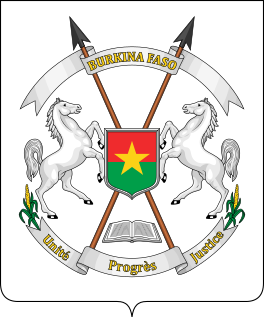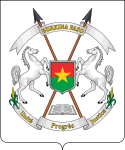
The history of Burkina Faso includes the history of various kingdoms within the country, such as the Mossi kingdoms, as well as the later French colonisation of the territory and its independence as the Republic of Upper Volta in 1960.

Presidential elections were held in Burkina Faso on 13 November 2005. Incumbent president Blaise Compaoré was re-elected with around 80% of the vote.

Change 2005 was a political alliance in Burkina Faso, founded to contest the presidential election in 2005. The incumbent, Blaise Compaore, was standing for a third term and was expected to win despite claims that another term in office would be unconstitutional. He was re-elected with 80.35% of the votes.

The National Union for Democracy and Development is a political party in Burkina Faso. A part of the country's opposition, the UNDD is currently led by Hermann Yaméogo, son of the country's first president, Maurice Yaméogo.

The Catholic Church in Burkina Faso is part of the worldwide Catholic Church, under the spiritual leadership of the Pope in Rome. According to the most recent census (2006) 19 percent of the population are members of the Catholic Church.
Articles related to Burkina Faso include:
The Republican Front was a coalition of political parties in Burkina Faso. The coalition was launched on January 23, 2014 at a conference held at Hotel Splendid in the capital Ouagadougou. Some forty political parties took part in the foundation of the coalition. The coalition emerged in response to popular protests against reform of Article 37. The coalition supported holding a referendum on Article 37 of the Constitution, which would have enabled the president Blaise Compaoré took be re-elected. Amongst the leaders present at the founding of the Republican Front were Assimi Kouanda, Alain Zoubga, Ram Ouédraogo, Hermann Yaméogo, Maxime Kaboré, Toussaint Abel Coulibaly and Diemdoda Dicko (CFD).
The 1966 Upper Voltan coup d'état was an event which took place on 3 January 1966 in the Republic of Upper Volta, when following large-scale popular unrest the military intervened against the government, forced President Maurice Yaméogo to resign, and replaced him with Lieutenant Colonel Sangoulé Lamizana. Lamizana would go on to rule until 1980, when yet another military coup d'état overthrew him. The 1966 coup would prove to be the first in a long line of Upper Voltan and later Burkinabé coups, both failed and successful such, and marked the beginning of half a century of military rule.
The 1980 Upper Voltan coup d'état took place on 25 November 1980 in the Republic of Upper Volta. Following a long period of drought, famine, popular unrest and labour strikes, Colonel Saye Zerbo overthrew President Sangoulé Lamizana, another military leader. Zerbo himself would be overthrown only two years later.
The 1982 Upper Voltan coup d'état took place in the Republic of Upper Volta on 7 November 1982. The coup, led by the little-known Colonel Gabriel Yoryan Somé and a slew of other junior officers within the military, many of them political radicals, overthrew the regime of Colonel Saye Zerbo. Zerbo had previously taken power just under two years prior to his own downfall.

The National Liberation Movement was a political party in Burkina Faso.
Burkina Faso–Palestine relations refers to the current and historical relationship between Palestine and Burkina Faso. Neither state maintains an embassy in the capital of the other, but the Palestine Liberation Organization (PLO) has a non-resident representative to the Burkinabé government.

The National Convention of Progressive Patriots–Social Democratic Party was a political party in Burkina Faso led by Pierre Tapsoba.

The Union of Social Democrats was a political party in Burkina Faso.

The Rally of Social-Democrat Independents was a political party in Burkina Faso led by Alain Bédouma Yoda.

The Party for Democracy and Rally was a political party in Burkina Faso led by Daouda Bayili.





